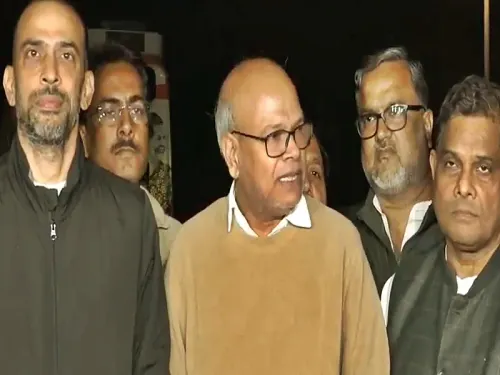What Does the New Online Gaming Bill Mean for Authorities?

Synopsis
Key Takeaways
- Legislation aims to ban online real-money gaming.
- Empowers authorities to search and arrest without a warrant.
- Focuses on promoting e-sports and skill-based gaming.
- Imposes severe penalties for violations.
- Potential loss of significant tax revenue.
Mumbai, Aug 20 (NationPress) The draft legislation introduced by the Union government to prohibit online real-money gaming (RMG) platforms was presented in the Lok Sabha on Wednesday. This bill empowers authorities to conduct searches at any location and detain individuals without a warrant if they are suspected of infringing the law.
The proposed legislation, known as 'the Promotion and Regulation of Online Gaming Bill 2025', aims to combat online money gaming, where players wager funds expecting financial returns, regardless of whether these games rely on skill or chance. The bill seeks to foster e-sports and social gaming, which are predominantly skill-oriented.
Additionally, the draft legislation bans online money gaming services and their promotion, while also restricting banks and financial institutions from engaging in transactions with such platforms.
The draft bill permits any officer appointed by the central government to “enter any place” and “search or arrest without a warrant any person” reasonably suspected of committing or preparing to commit an offence under this Act.
The bill defines “any place” to encompass any premises, building, vehicle, computer resource, virtual digital space, electronic records, or electronic storage device.
The legislation states, “The officer may access computer resources, virtual digital spaces, electronic records, or storage devices by overriding any access control or security code if such code is unavailable.”
Given that RMG platforms were already subject to a 28 percent GST on deposits (introduced in 2023), with suggestions to raise this to 40 percent, the ban proposed by the bill could potentially diminish tax revenue by over Rs 20,000 crore.
The government appears resolute in its intent to address the increasing prevalence of online money gaming, which has been linked to addiction, financial distress, and criminal activity.
The Union Minister for Electronics and Information Technology, Ashwini Vaishnaw, noted in a statement accompanying the bill, “These platforms often promote compulsive and addictive behaviour, resulting in financial ruin, mental health disorders, and increasing incidents of fraud and exploitation.”
The legislation proposes penalties of three years of imprisonment and fines of up to Rs 1 crore for individuals involved in offering, assisting, encouraging, inciting, or participating in RMG. Furthermore, it suggests a maximum of two years in prison or a fine of Rs 50 lakh for those advertising, promoting, or sponsoring such games.
–IANS
aar/na









